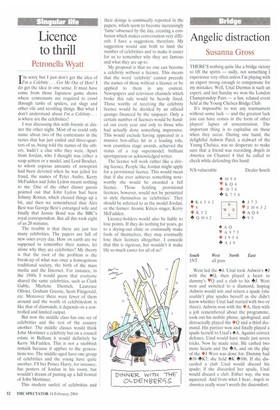Licence to thrill
Petronella Wyatt
T'm sorry but I just don't get the idea of 1rm a Celebrity . . . Get Me Out of Here! I do get the idea in one sense. It must have come from those Japanese game shows where contestants are required to crawl through tanks of spiders, eat slugs and other vile and revolting things. But what I don't understand about I'm a Celebrity . . is where are the celebrities?
I was discussing this with friends at dinner the other night. Most of us could only name about two of the contestants in the series that has just ended and three-quarters of us, being told the names of the others, hadn't a clue who they were. Apart from Jordan, who I thought was either a soap actress or a model, and Lord Brocket, to whom copious amounts of newsprint had been devoted when he was jailed for fraud, the names of Peter Andre, Kerry McFadden and John Lydon meant nothing to me. One of the other dinner guests pointed out that John Lydon had been Johnny Rotten, which cleared things up a bit, and then we remembered that Alex Best was George Best's estranged wife and finally that Jennie Bond was the BBC's royal correspondent. But all this took eight of us 20 minutes.
The trouble is that there are just too many celebrities. The papers are full of new ones every day. How on earth are we supposed to remember their names, let alone why they are celebrities? My theory is that the root of the problem is the break-up of what was once a homogenous traditional society, the birth of the mass media and the Internet. For instance, in the 1940s I would guess that everyone shared the same celebrities, such as Clark Gable, Marlene Dietrich, Laurence Olivier, Graham Greene, Scott Fitzgerald, etc. Moreover there were fewer of them around and the worth of celebritydom is like that of diamonds; it depends on a controlled and limited output.
But now the middle class has one set of celebrities and the rest of the country another. The middle classes would think John Mortimer a celebrity but on a council estate in Balham it would definitely be Kerry McFadden. This is not a snobbish remark because it applies to the generations too. The middle-aged have one group of celebrities and the young have quite another. I'll bet Prince Harry, for instance, has posters of Jordan in his room, but wouldn't dream of putting up a full frontal of John Mortimer.
This modern surfeit of celebrities and
their doings is continually reported in the papers, which seem to become increasingly lame'-obsessed by the day, creating a confusion which makes conversation very difficult. I have a suggestion, therefore. My suggestion would aim both to limit the number of celebrities and to make it easier for us to remember why they are famous and what they are up to.
My proposal is that no one can become a celebrity without a licence. This means that the word 'celebrity' cannot precede the names of those without a licence or be applied to them in any context. Newspapers and television channels which broke this rule would be heavily fined. Those worthy of receiving the celebrity licence would be decided by an official quango financed by the taxpayer. Only a certain number of licences would be handed out every year and only to those who had actually done something impressive. This would exclude having appeared in a massive box-office hit in a leading role, won countless stage awards, achieved the status of a top supermodel, brilliant sportsperson or acknowledged writer.
The licence will work rather like a driving licence. People like Jordan might apply for a provisional licence. This would mean that if she ever achieves something noteworthy she would be awarded a full licence. Those holding provisional licences, however, would not be permitted to style themselves as `celebrities'. They should be referred to as the model Jordan, or the former Atomic Kitten singer, Kerry McFadden.
Licence-holders would also be liable to lose points. If they do nothing for years, go to a drying-out clinic or continually make fools of themselves, they may eventually lose their licences altogether. I concede that this is rigorous, but wouldn't it make life so much easier for all of us?


































































 Previous page
Previous page